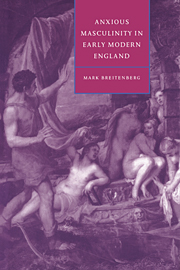Book contents
- Frontmatter
- Contents
- Acknowledgments
- Introduction
- 1 Fearful fluidity: Burton's Anatomy of Melancholy
- 2 Purity and the dissemination of knowledge in Bacon's new science
- 3 Publishing chastity: Shakespeare's “The Rape of Lucrece”
- 4 The anatomy of masculine desire in Love's Labor's Lost
- 5 Inscriptions of difference: cross-dressing, androgyny and the anatomical imperative
- 6 Ocular proof: sexual jealousy and the anxiety of interpretation
- Notes
- Index
3 - Publishing chastity: Shakespeare's “The Rape of Lucrece”
Published online by Cambridge University Press: 19 November 2009
- Frontmatter
- Contents
- Acknowledgments
- Introduction
- 1 Fearful fluidity: Burton's Anatomy of Melancholy
- 2 Purity and the dissemination of knowledge in Bacon's new science
- 3 Publishing chastity: Shakespeare's “The Rape of Lucrece”
- 4 The anatomy of masculine desire in Love's Labor's Lost
- 5 Inscriptions of difference: cross-dressing, androgyny and the anatomical imperative
- 6 Ocular proof: sexual jealousy and the anxiety of interpretation
- Notes
- Index
Summary
In this chapter my discussion is organized around the circulation of three critical figures in the rhetoric of early modern masculinity: honor, publication and desire. In a specifically poetic context, I will look closely at the function of these figures as the bases for Shakespeare's representation and critique of masculinity in his early poem, “The Rape of Lucrece.” In a broadly cultural context, I will consider how the poem's preoccupations and problems rehearse several distinctively Elizabethan discursive practices and belief systems involving honor among men as an often contradictory basis of male identity. By moving simultaneously in both directions, my discussion enacts the reciprocal circulation (rather than rigid demarcation) between the aesthetic and social which is especially characteristic of this period. But it also enacts a series of analogous reciprocities between: private and public spheres, private reading and public declaration, the enclosed and the disclosed, domestic space and the social arena, and finally, between what might be abstractly called inherent and circulated value. My arguments throughout this chapter thus reside at the contradiction between a cultural imperative to mark such binary differences and the impossibility of doing so; it interrogates, in this sense, some of the culture's interstitial anxieties. Lucrece herself poses a version of this question as she gazes forlornly at a mural depicting one of the West's most influential and potent myths – the story of Troy: “Why should the private pleasure of some one / Become the public plague of so many?”
I intend the term “honor” to embrace all its multivalent significations in the early modern period, including often synonymous words such as reputation, credit, fame and opinion.
- Type
- Chapter
- Information
- Anxious Masculinity in Early Modern England , pp. 97 - 127Publisher: Cambridge University PressPrint publication year: 1996
- 1
- Cited by

